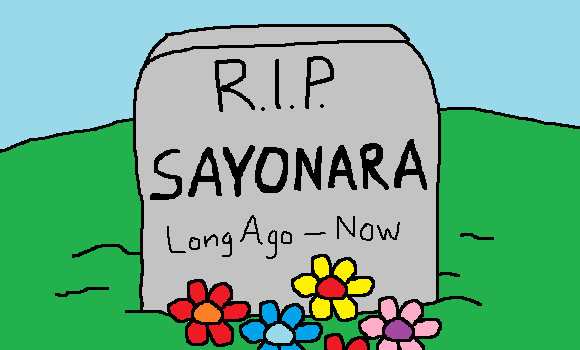
But if the word for “goodbye” is dying, how do we say goodbye to it?
If you were to ask people who have never studied Japanese before to name some Japanese words they know, chances are there’s a few that would come up again and again: sushi, samurai, ninja, konnichiwa, and of course, sayonara – “goodbye.”
After all, you can’t say “sayonara, suckers!” without sayonara, right? But as it turns out, we may end up being the suckers here.
According to a recent survey conducted by Japan’s livedoor NEWS, the average Japanese person doesn’t use the word “sayonara” at all. They asked 30 people of a variety of ages and genders if they used the word, and the results don’t look good for “goodbye” word.
Twenty-one of the 30 people — 70 percent — said they “don’t use it” or “don’t use it all.” And when narrowed down to the younger crowd, 20- to 30-year-olds only, 11 out of 14, or 80 percent, said the same. The sampling size may not be the largest, admittedly, but chances are similar percentages would carry over into the population at large.
Here are some reasons for why people seem to be saying “goodbye” to sayonara:
“I don’t like ‘sayonara’ because it makes our meeting feel like the end.”
“Saying ‘sayonara’ makes it seem like we won’t meet again, so I don’t use it. It feels like a cold word.”
“At work or with family and friends, I always just say ‘see you later’ instead.”
“Sayonara” definitely has an air of finality to it. Just like most English speakers don’t say “farewell” unless it’s truly the end, most Japanese people would feel a little strange saying “sayonara” if they were just going to see the same person again tomorrow.
But then that brings up another question: if you’re not going to say goodbye to someone with “sayonara,” what do you say instead?
Luckily, Japanese is a veritable buffet when it comes to different ways of saying hello, goodbye, and everything in between. Here are just a few samples of all the different tasty expressions you can use to part ways with someone without sounding like a samurai departing for some distant land:
Ja ne. (See ya)
Mata ne/kondo/ashita/raishuu. (See you later/next time/tomorrow/next week)
Shitsurei shimasu. (I’m sorry for having been rude – on ending a phone call, leaving work, etc.)
Osaki ni shitsurei shimasu. (I’m sorry for rudely leaving before you [at work])
Otsukaresama desu. (You must be tired, thank you for your work.)
Gokigenyou. (Fare thee well – if you want to sound fancy)
Bai bai. (If you want to sound cute or like a JK)
So the next time you’re out with Japanese-speaking people, what will you do? Will you help resuscitate the dying “sayonara?” Or will you let it die its linguistic death and enjoy the rainbow of other “goodbye” flavors? Make your choice soon, before it’s too late to say “farewell!”
Source: livedoor NEWS via My Game News Flash
Featured/top image: © RocketNews24

 In the mood for love and pizza? Domino’s will deliver your pie with romantic kabe-don wall pound
In the mood for love and pizza? Domino’s will deliver your pie with romantic kabe-don wall pound Pop quiz: Test yourself in 5 situations of Japanese manners and customs
Pop quiz: Test yourself in 5 situations of Japanese manners and customs Is this common Japanese phrase for “goodbye” the reason for Japan’s crazy overtime hours?
Is this common Japanese phrase for “goodbye” the reason for Japan’s crazy overtime hours? Japan’s amazing Excel artist wishes everyone a happy new year using the spreadsheet program
Japan’s amazing Excel artist wishes everyone a happy new year using the spreadsheet program Anti-stalker Male Voice Clip Collection for Women Who Live Alone released by Japanese band【Video】
Anti-stalker Male Voice Clip Collection for Women Who Live Alone released by Japanese band【Video】 Red light district sushi restaurant in Tokyo shows us just how wrong we were about it
Red light district sushi restaurant in Tokyo shows us just how wrong we were about it McDonald’s new Happy Meals offer up cute and practical Sanrio lifestyle goods
McDonald’s new Happy Meals offer up cute and practical Sanrio lifestyle goods Tokyo Tsukiji fish market site to be redeveloped with 50,000-seat stadium, hotel, shopping center
Tokyo Tsukiji fish market site to be redeveloped with 50,000-seat stadium, hotel, shopping center Historical figures get manga makeovers from artists of Spy x Family, My Hero Academia and more
Historical figures get manga makeovers from artists of Spy x Family, My Hero Academia and more Anime girl English teacher Ellen-sensei becomes VTuber/VVTUber and NFT
Anime girl English teacher Ellen-sensei becomes VTuber/VVTUber and NFT Sandwiches fit for a sumo served up in Osaka【Taste Test】
Sandwiches fit for a sumo served up in Osaka【Taste Test】 Akihabara pop-up shop sells goods made by Japanese prison inmates
Akihabara pop-up shop sells goods made by Japanese prison inmates Beautiful Ghibli sealing wax kits let you create accessories and elegant letter decorations【Pics】
Beautiful Ghibli sealing wax kits let you create accessories and elegant letter decorations【Pics】 Limited-edition Carbonara Udon will anger noodle purists and pasta lovers 【Taste test】
Limited-edition Carbonara Udon will anger noodle purists and pasta lovers 【Taste test】 Starbucks Japan adds a Motto Frappuccino to the menu for a limited time
Starbucks Japan adds a Motto Frappuccino to the menu for a limited time All-you-can-drink Starbucks and amazing views part of Tokyo’s new 170 meter-high sky lounge
All-you-can-drink Starbucks and amazing views part of Tokyo’s new 170 meter-high sky lounge More foreign tourists than ever before in history visited Japan last month
More foreign tourists than ever before in history visited Japan last month Japanese ramen restaurants under pressure from new yen banknotes
Japanese ramen restaurants under pressure from new yen banknotes French Fries Bread in Tokyo’s Shibuya becomes a hit on social media
French Fries Bread in Tokyo’s Shibuya becomes a hit on social media Studio Ghibli releases new action figures featuring Nausicaä of the Valley of the Wind characters
Studio Ghibli releases new action figures featuring Nausicaä of the Valley of the Wind characters New private rooms on Tokaido Shinkansen change the way we travel from Tokyo to Kyoto
New private rooms on Tokaido Shinkansen change the way we travel from Tokyo to Kyoto Starbucks reopens at Shibuya Scramble Crossing with new look and design concept
Starbucks reopens at Shibuya Scramble Crossing with new look and design concept Studio Ghibli glasses cases let anime characters keep an eye on your spectacles
Studio Ghibli glasses cases let anime characters keep an eye on your spectacles Studio Ghibli releases Kiki’s Delivery Service chocolate cake pouches in Japan
Studio Ghibli releases Kiki’s Delivery Service chocolate cake pouches in Japan New definition of “Japanese whiskey” goes into effect to prevent fakes from fooling overseas buyers
New definition of “Japanese whiskey” goes into effect to prevent fakes from fooling overseas buyers Our Japanese reporter visits Costco in the U.S., finds super American and very Japanese things
Our Japanese reporter visits Costco in the U.S., finds super American and very Japanese things Studio Ghibli unveils Mother’s Day gift set that captures the love in My Neighbour Totoro
Studio Ghibli unveils Mother’s Day gift set that captures the love in My Neighbour Totoro New Japanese KitKat flavour stars Sanrio characters, including Hello Kitty
New Japanese KitKat flavour stars Sanrio characters, including Hello Kitty New Pokémon cakes let you eat your way through Pikachu and all the Eevee evolutions
New Pokémon cakes let you eat your way through Pikachu and all the Eevee evolutions Disney princesses get official manga makeovers for Manga Princess Cafe opening in Tokyo
Disney princesses get official manga makeovers for Manga Princess Cafe opening in Tokyo Sales of Japan’s most convenient train ticket/shopping payment cards suspended indefinitely
Sales of Japan’s most convenient train ticket/shopping payment cards suspended indefinitely Sold-out Studio Ghibli desktop humidifiers are back so Totoro can help you through the dry season
Sold-out Studio Ghibli desktop humidifiers are back so Totoro can help you through the dry season Japanese government to make first change to romanization spelling rules since the 1950s
Japanese government to make first change to romanization spelling rules since the 1950s Ghibli founders Toshio Suzuki and Hayao Miyazaki contribute to Japanese whisky Totoro label design
Ghibli founders Toshio Suzuki and Hayao Miyazaki contribute to Japanese whisky Totoro label design Doraemon found buried at sea as scene from 1993 anime becomes real life【Photos】
Doraemon found buried at sea as scene from 1993 anime becomes real life【Photos】 Tokyo’s most famous Starbucks is closed
Tokyo’s most famous Starbucks is closed One Piece characters’ nationalities revealed, but fans have mixed opinions
One Piece characters’ nationalities revealed, but fans have mixed opinions We asked a Uniqlo employee what four things we should buy and their suggestions didn’t disappoint
We asked a Uniqlo employee what four things we should buy and their suggestions didn’t disappoint Princesses, fruits, and blacksmiths: Study reveals the 30 most unusual family names in Japan
Princesses, fruits, and blacksmiths: Study reveals the 30 most unusual family names in Japan Domino’s Japan offering discounts to customers who pound the wall, show mementos from old flames
Domino’s Japan offering discounts to customers who pound the wall, show mementos from old flames Foreign English teachers in Japan pick their favorite Japanese-language phrases【Survey】
Foreign English teachers in Japan pick their favorite Japanese-language phrases【Survey】 Geminoid F: Japan’s android actress with a starring role in a new film 【Video】
Geminoid F: Japan’s android actress with a starring role in a new film 【Video】 Japan’s second-largest convenience store chain changes service policy for sake of foreign workers
Japan’s second-largest convenience store chain changes service policy for sake of foreign workers Why hayashi rice should be your last meal before leaving Japan
Why hayashi rice should be your last meal before leaving Japan 30 common characteristics of people who fall in love with Japan
30 common characteristics of people who fall in love with Japan Japanese restaurant puts up sign that every waiter and waitress has always wanted
Japanese restaurant puts up sign that every waiter and waitress has always wanted Japanese Network TV asks Twitter user’s permission for “photo” of a trash home…from Fallout 76
Japanese Network TV asks Twitter user’s permission for “photo” of a trash home…from Fallout 76 The smallest Family Mart in Japan closes down
The smallest Family Mart in Japan closes down Japanese Internet sad to see the word “chikan” becoming commonly used in English
Japanese Internet sad to see the word “chikan” becoming commonly used in English Should saying thanks at a Japanese convenience store go without saying?
Should saying thanks at a Japanese convenience store go without saying? You beautiful fatty! — Doraemon character teaches us to speak nicely with new smartphone app
You beautiful fatty! — Doraemon character teaches us to speak nicely with new smartphone app How to make okonomiyaki at home【SoraKitchen】
How to make okonomiyaki at home【SoraKitchen】 SMAP idol group members issue farewell messages to fans
SMAP idol group members issue farewell messages to fans Online poll ranks JoJo’s Bizarre Adventures most bizarre sound effects
Online poll ranks JoJo’s Bizarre Adventures most bizarre sound effects Real-life Olaf takes Twitter by (snow)storm
Real-life Olaf takes Twitter by (snow)storm
Leave a Reply